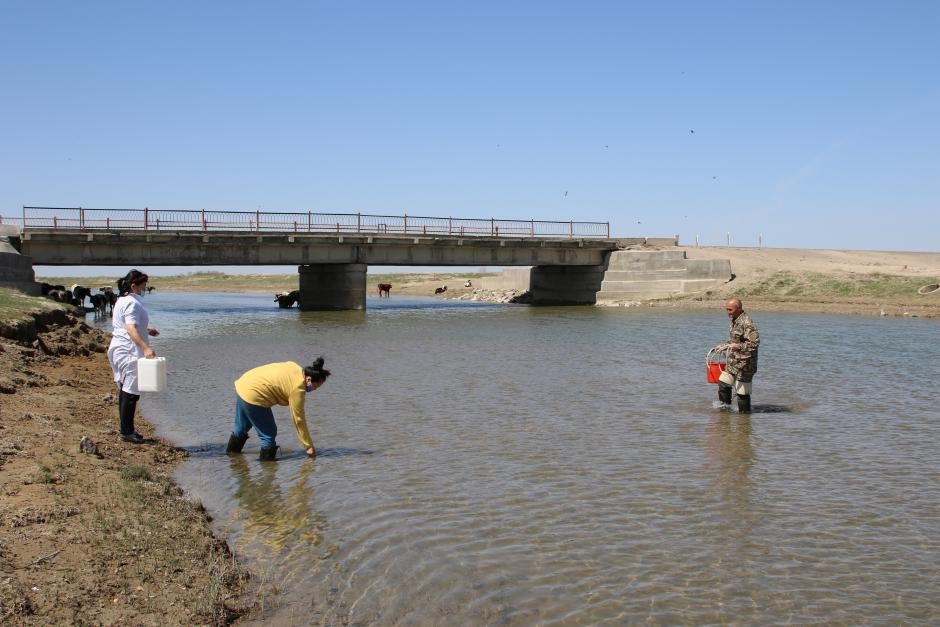heading
PROJECT: GOVERNANCE, ACCOUNTABILITY AND LEARNING FOR WATER SUSTAINABILITY (GOAL-WATERS)Kazakhstan
Developing transboundary water policy, and accelerating national cooperation between the governments of Kazakhstan and Kyrgyzstan.

The project goal is to support and harmonize the transboundary water policy development by implementing capacity development initiatives.
As part of this goal, the project supports the existing efforts of the governments of Kazakhstan and Kyrgyzstan to settle cooperation priorities through different initiatives at national and transboundary levels.
The project provides an enabling environment for a cooperation agreement between governments and transboundary river basin commissions to implement regional initiatives on the sustainable use of transboundary water resources.
Challenge
Limited knowledge and understanding of the situation, inefficient use of water resources, lack of cooperation between national and regional/local organizations, inconsistent frameworks and investment shortfalls present major challenges when it comes to good water governance in these regions.
In addition, there are many actors involved in water resources management and administration – and the responsible institutions in both countries, especially in Kyrgyzstan, have been weakened by repeated reforms of the administrative structures.
Strategy
The project is a logical follow-up and significant strengthening of completed and current projects implemented in the 1997 Agreement between the Government of the Republic of Kazakhstan and the Government of the Kyrgyz Republic, and the 2000 Agreement on the use of water facilities for inter-governmental use for the Chu and Talas Rivers.
- Steps have been taken to strengthen the interaction of stakeholders involved in the processes in the two countries. However, continued work and external support are needed to ensure further cooperation between authorities.
The strategy to advance transboundary water cooperation will facilitate the protection of water ecosystems, water quality improvement, and the joint use of water resources.
Further planned actions include:
- Analysis of the root causes for each problem and identification of specific practices, sources, locations, and human activity leading to environmental degradation and other threats.
- Providing a platform to facilitate good cooperation and understanding between the two countries sharing the water resources in the Chu and Talas river basin water commissions.
- Improving sustainable use of the basin’s water resources, proper water quality management and the protection of ecosystems.
- Involving local stakeholders ready to minimize the negative consequences for economic sectors and the environment in the basin.
Achievements
A strategic Action Plan was endorsed by the Governments of Kazakhstan and Kyrgyzstan. Training modules and training programs for farming businesses have been completed and are now being distributed to reach out to 40 percent of farmers in the targeted regions.
For awareness raising activities 25 different thematic brochures on water and land-use efficiency and two large scale guiding books on farm business management and a Farm record book (with coverage of 40 percent of farmers in project’s target regions) have been printed, and radio spots have been broadcasted on the impact of land degradation and desertification in respect to water. 14 trainings modules and 11 training programs were undertaken and supported capacity building for 87 policy makers and technical experts. In addition to the radio spots, one movie on transboundary water resource management was broadcasted as part of local sensitization activities.
Cooperation with Water Information Network CAR@WAN has been established. CAR@WAN is delivering capacity development activities for building and strengthening water monitoring skills and the understanding of environmental issues among basin committees, policy makers, and farmers. The center was fully renovated, and re-equipped, with key analytical software tools being installed (standard precipitation index and rain module). The new analytical software is now fully operational and has been used to deliver their first reports on standard precipitation index and rain modules.
The intervention has also contributed to broader governance processes. For example, the project task force group is fully engaged in the development of the new strategy for the development of the water sector 2020-2030 as well as the draft of the Water Code of the Republic of Kazakhstan. There has also been a new inter-governmental agreement between Kazakhstan, Kyrgyzstan and Tajikistan on exchange of water and electricity.
